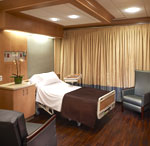PHILADELPHIA – Even while being universally recognized as a health care institution that delivers leading-edge patient care, Penn Medicine still has to compete every day with its peers across the nation for the privilege of treating its patients. In an effort to satisfy patient requests while also helping to fund hospital programs that aid the less fortunate, Penn Medicine is opening its second special services, in-patient unit– The Pavilion at Pennsylvania Hospital (PAH).
 |
Patient Bed at the Pavilion at Pennsylvania Hospital
Click on thumbnail
to view more images |
Officially opening to patients on Tuesday, April 28th, The Pavilion is housed within the main hospital campus on Spruce Street between 8th and 9th Streets.
With eight private rooms, The Pavilion at PAH offers five-star amenities, chef-prepared foods, fine linens, concierge service, and more, all for an additional fee of $400 a day. More importantly, however, The Pavilion offers patients and their families a choice and a measure of control. Choice is difficult to come by in these days of managed care. But in almost every other part of our culture, having a choice in what we buy, say and do is expected and considered “the American way.”
Why Now?
“We decided to open a Pavilion unit at PAH in response to the increasing patient demand,” said George Hollingsworth, director of The Pavilion at PAH and Manager of Patient and Guest Relations. “Despite the current economic downturn, there has been consistent interest in offering our patients this option, which is really a matter of choice – not wealth.”
“It’s also important to note that funds raised by The Pavilion at PAH will help finance other non-income-generating – yet extremely vital –hospital programs,” added Hollingsworth.
More About The Pavilion at Pennsylvania Hospital:
- The unit offers patients the same excellent quality of health care with added amenities; the quality of care and nursing ratios will be at the same level as the rest of Pennsylvania Hospital.
- The Pavilion provides luxury accommodations and services including a secured entryway; “hotel-style” rooms; personal electronics - including DVD players; gourmet meals; fine linens; boutique toiletries; convertible furniture to accommodate a family member; daily newspapers; and an in-room safe.
- The unit hosts a Family Business Center, equipped with computers, for family members visiting a patient in The Pavilion
###
PENN Medicine is a $3.6 billion enterprise dedicated to the related missions of medical education, biomedical research, and excellence in patient care. PENN Medicine consists of the University of Pennsylvania School of Medicine (founded in 1765 as the nation's first medical school) and the University of Pennsylvania Health System.
Penn's School of Medicine is currently ranked #3 in the nation in U.S.News & World Report's survey of top research-oriented medical schools; and, according to the National Institutes of Health, received over $366 million in NIH grants (excluding contracts) in the 2008 fiscal year. Supporting 1,700 fulltime faculty and 700 students, the School of Medicine is recognized worldwide for its superior education and training of the next generation of physician-scientists and leaders of academic medicine.
The University of Pennsylvania Health System (UPHS) includes its flagship hospital, the Hospital of the University of Pennsylvania, rated one of the nation’s top ten “Honor Roll” hospitals by U.S.News & World Report; Pennsylvania Hospital, the nation's first hospital; and Penn Presbyterian Medical Center. In addition UPHS includes a primary-care provider network; a faculty practice plan; home care, hospice, and nursing home; three multispecialty satellite facilities; as well as the Penn Medicine Rittenhouse campus, which offers comprehensive inpatient rehabilitation facilities and outpatient services in multiple specialties.
Penn Medicine is one of the world’s leading academic medical centers, dedicated to the related missions of medical education, biomedical research, excellence in patient care, and community service. The organization consists of the University of Pennsylvania Health System and Penn’s Raymond and Ruth Perelman School of Medicine, founded in 1765 as the nation’s first medical school.
The Perelman School of Medicine is consistently among the nation's top recipients of funding from the National Institutes of Health, with $550 million awarded in the 2022 fiscal year. Home to a proud history of “firsts” in medicine, Penn Medicine teams have pioneered discoveries and innovations that have shaped modern medicine, including recent breakthroughs such as CAR T cell therapy for cancer and the mRNA technology used in COVID-19 vaccines.
The University of Pennsylvania Health System’s patient care facilities stretch from the Susquehanna River in Pennsylvania to the New Jersey shore. These include the Hospital of the University of Pennsylvania, Penn Presbyterian Medical Center, Chester County Hospital, Lancaster General Health, Penn Medicine Princeton Health, and Pennsylvania Hospital—the nation’s first hospital, founded in 1751. Additional facilities and enterprises include Good Shepherd Penn Partners, Penn Medicine at Home, Lancaster Behavioral Health Hospital, and Princeton House Behavioral Health, among others.
Penn Medicine is an $11.1 billion enterprise powered by more than 49,000 talented faculty and staff.